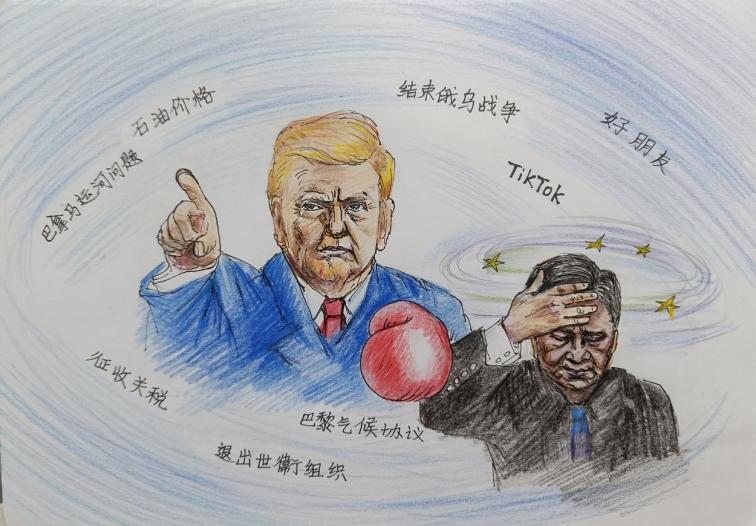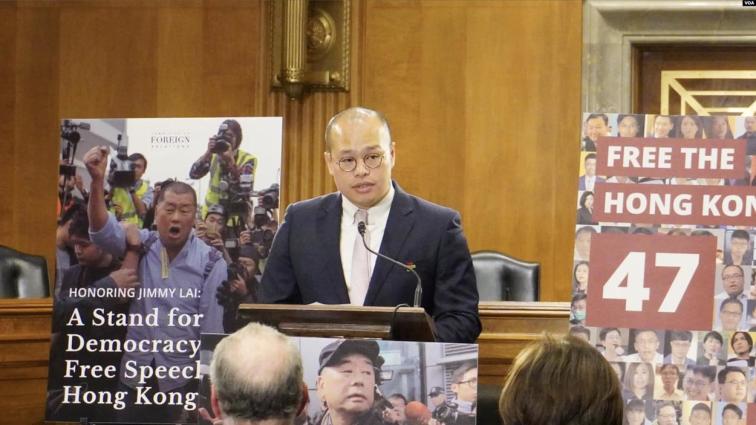Chinese Coast Guard Intercepts Vietnamese Fishing Boat (Video Screenshot)
People News - On February 19, a spokesperson for the Chinese Ministry of Foreign Affairs stated that China opposes Vietnam’s land reclamation activities on a disputed reef in the South China Sea. The reef, referred to by China as “Bai Reef,” is part of the Spratly Islands. Since the 1980s, Vietnam has occupied Bai Reef, though several countries claim sovereignty over it.
According to Voice of America, the U.S.-based think tank Center for Strategic and International Studies (CSIS), which has studied the South China Sea disputes for years, reported that over the past decade, China has completed 16 land reclamation projects in the South China Sea, creating nearly 16 square kilometers of land. To counter China’s assertive actions in disputed South China Sea waters, Vietnam has also carried out its own land reclamation and island expansion projects.
Since 2022, Vietnam has expanded Bai Reef tenfold and excavated a 299-meter-wide channel at the reef, large enough to accommodate warships and other large vessels. CSIS stated that Vietnam has conducted land reclamation on 20 islands and reefs in the South China Sea, creating about 3.5 square kilometers of land. Although Vietnam’s total reclaimed land area is only about one-fourth of China’s, CSIS considers Vietnam the largest land reclamation actor in the South China Sea after China.
It is clear that, despite the outwardly close relationship between China and Vietnam, there are significant differences regarding the South China Sea issue. Vietnam consistently advocates for resolving all disputes and differences through peaceful means based on international law, including the 1982 United Nations Convention on the Law of the Sea (UNCLOS). Vietnam also emphasizes the full implementation of the Declaration on the Conduct of Parties in the South China Sea (DOC) and the early conclusion of a practical, effective, and mutually beneficial Code of Conduct (COC) in line with international law through negotiations.
Vietnam reiterated this stance during various high-level exchanges, including former General Secretary of the Communist Party of Vietnam Nguyen Phu Trong’s visit to China in 2022, Xi Jinping’s visit to Vietnam in 2023, and Vice Chairman of China’s Central Military Commission Zhang Youxia’s visit to Vietnam in October 2024. However, China, unwilling to abide by international law, does not tolerate other countries gaining an upper hand.
Over the past decade, Beijing has not only conducted land reclamation and artificial island construction in disputed areas of the South China Sea but also fully militarized these islands. It has frequently deployed coast guard vessels, maritime militia ships, and even naval warships to assert its so-called sovereignty and jurisdiction in the region. China’s aggressive actions have often led to confrontations and conflicts with the Philippines in disputed waters. In response, the Philippines allowed the U.S. Army to deploy a "Typhoon" medium-range missile system in its northern region in April last year.
While Vietnam has not had intense conflicts with China, it has expressed dissatisfaction with China's actions, as indicated during several high-level meetings between the Vietnamese and Chinese leadership.
After China expressed discontent over Vietnam’s land reclamation on Bai Reef, Vietnam has not issued any official response. However, on February 20, Vietnam’s state-run Vietnam News Agency published a report titled "Philippines Successfully Blocks Several External Cyberattack Attempts."
The report stated that the Philippines recently detected and thwarted several attempts at external cyberattacks aimed at infiltrating its intelligence data systems. According to the Philippine Secretary of Information and Communications Technology, the attacks utilized advanced hacking techniques and deceptive methods to penetrate government computer systems. Most of these cyberattacks were attributed to foreign entities. To counter this threat, the Philippine government is strengthening international cooperation through diplomatic channels and sharing intelligence with the military and other nations to identify potential threats and enhance defenses.
The report also noted that last year, Philippine law enforcement thwarted attacks by foreign hacker groups targeting the Philippine president’s website and government email systems. In addition to cyberattacks, the Secretary warned of an increase in the spread of deepfake technology and disinformation, which could be used to manipulate public opinion and influence the upcoming midterm elections in the Philippines this May.
While the Vietnam News Agency avoided directly naming China, it implied that China was behind the cyberattacks on the Philippines and that the Philippines was seeking U.S. assistance.
In January of this year, Bloomberg reported that Chinese hackers had attacked the Philippine government, stealing sensitive military data in a long-running operation spanning several years. Many of the stolen documents were believed to be related to territorial disputes between China and the Philippines in the South China Sea. According to emails obtained by Bloomberg, the Philippine president’s office sent a letter to cybersecurity experts in May 2024 seeking details on the hacking incidents.
Bloomberg, citing insider sources, reported that the attack on the president’s office was part of a broader espionage campaign that infiltrated multiple Philippine institutions and organizations, including hospital networks. During the attack, hackers used stolen credentials to access the network, installed malware, and erased evidence of their intrusion.
In November 2023, a report from U.S. cybersecurity firm Palo Alto Networks revealed that a Chinese hacking group named "Stately Taurus" launched a five-day attack on Philippine government agencies in August, coinciding with a maritime conflict between the two nations in the South China Sea.
Additionally, data from Netherlands-based cybersecurity company Surfshark showed that over 60,000 Philippine user accounts were compromised in the third quarter of 2023. In September, a breach of the Philippine Health Insurance Corporation’s (PHIC) servers exposed the personal data of millions. A few weeks later, hackers also targeted the Philippine House of Representatives website.
China, as expected, denied the accusations, calling them "baseless and politically motivated smear campaigns." However, China’s behavior has not gone unnoticed by the Philippines, Vietnam, and other nations. By publishing news of the Philippines’ resistance to China after Beijing’s protest over land reclamation on Bai Reef, Vietnam signaled its discontent with China’s bullying tactics and hinted at the possibility of seeking U.S. assistance.
The concept of “losing support by acting unjustly” is something China is now feeling more deeply than ever. △
(First published by People News)










News magazine bootstrap themes!
I like this themes, fast loading and look profesional
Thank you Carlos!
You're welcome!
Please support me with give positive rating!
Yes Sure!